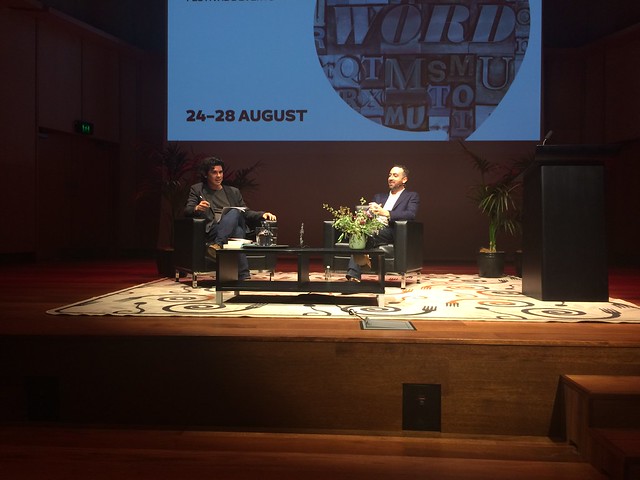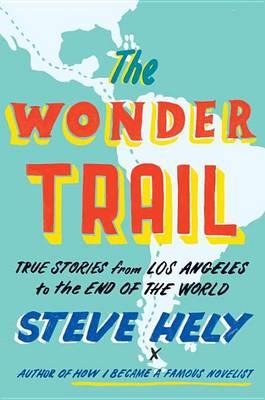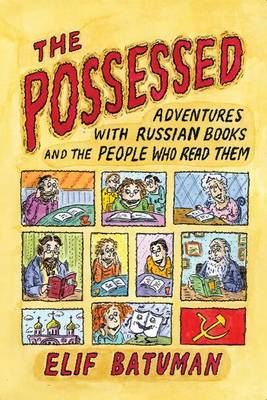I'd be willing to bet cold, hard cash that of all the writers who took part in WORD Christchurch this year, Steve Hely is the only one who has "actor: flautist and shirtless bohemian, The Office (US)" on their CV. Assuming that he does, in fact, even have that on his CV... and if not, why?
One possible reason is that despite this and at least one other noteworthy appearance on 30 Rock, Steve Hely is actually a writer.
He's also one of those annoying people who are intelligent, funny, and interested in lots of things and therefore make the rest of us feel bad with their rampant overachieving.
In addition to having worked on some of the best comedy shows EVER (in addition to The Office and 30 Rock, there's American Dad and chaotic political comedy Veep - pretty sure those are on the CV), he also does a podcast, The Great Debates, in which he argues passionately about the big questions in life... such as whether dogs should be allowed on the beach.
He's also written several books. His novel "How I became a famous novelist" is a satire of the literary world (and somewhat awkwardly, given the context of this talk, literary festivals).
His two non-fiction efforts are both travel books, of a kind. The first, The Ridiculous Race, documents the competition he and friend Vali Chandrasekaran undertook to travel around the world, in opposite directions, without air travel. First one back to Los Angeles won. The second follows him on his trip down the west of the South American continent, right down to Tierra del Fuego at the southern end of Chile.
On Comedy writing
Toby Manhire started out asking him quite a few questions about the process of television comedy writing*, and how it differed between shows like Late Night with David Letterman and 30 Rock.
Letterman had much more of a factory approach where people worked independently like "12 monkeys at 12 typewriters", which answers the question "if infinite monkeys on infinite typewriters will eventually produce Shakespeare, what will a drastically smaller number get you?" A Letterman top ten list, is the answer.

Sitcoms, according to Hely are a more collaborative kind of environment, though being employed as a writer on a show that is already hugely successful is pretty intimidating. Of his arrival at 30 Rock, says Hely "I was a scared little puppy trying to help out".
Inspiration can come from anywhere. Great television writers have a magpie-ish ability to retain "something weird, some odd sentence that someone said to them" and turn that into a gag or even a whole episode. There is also such a thing as "riffing" for comedy writers though it's "embarrassing to talk about compared with guitar music because it's less cool, but it is, in a way, similar to how music is made".
With regards to his forays into sitcom acting, it was definitely useful, as a writer, to have that experience, to be able to understand what it's like for the actors.
"The feeling of being an actor is terrifying and strange.
And in a long-running show like The Office, the actors have spent more time with their characters than many of the writers have so "you're wise to listen to the actors' ideas about their characters."
On Travel
Hely admits to a certain kind of wanderlust and feels that travel breaks a person out of the routine ways of doing things, creating a certain kind of heightened awareness. Where will I get food? Where will I sleep?
"It really makes you feel alive".
He's also interested in the whole genre of travel writing - the history of going somewhere and reporting back on it, from Herodotus to Mark Twain (another American writer who has visited Christchurch, by the way).
 There are examples of this interest in The Wonder Trail, which in certain chapters feels like a meta-travel book (a travel book about travel books) when Hely documents the history of what what travellers of old have made of the place that he's visiting in the present, which allows you the perspective of seeing what has changed (or not) in the meantime. It's an amusing, enlightening, and informative read, whether you've any interest in travelling to South America yourself or not, there's plenty to keep you reading.
There are examples of this interest in The Wonder Trail, which in certain chapters feels like a meta-travel book (a travel book about travel books) when Hely documents the history of what what travellers of old have made of the place that he's visiting in the present, which allows you the perspective of seeing what has changed (or not) in the meantime. It's an amusing, enlightening, and informative read, whether you've any interest in travelling to South America yourself or not, there's plenty to keep you reading.
On Trump, Clinton and Sir Edmund Hilary
There's no denying it, things have gotten weird. Or as Hely puts it "that satire is being outpaced by reality is alarming". Er, yes, it is rather.
Hely is in a good position to say just how alarming as he got press credentials for and attended the Republican National Convention. He found it "upsetting", though in the wake of Ted Cruz not endorsing Trump it felt "like a pro-wrestling match - I enjoyed the chaos of that".
A lot of Trump's political success, he believes, is "because politicians are boring"... as they should be - "I want boring people working on policy," he says.
Trump is woefully unprepared for the job.
"His plans for being president don't seem like those of someone who thought about being president for more than an hour..."
Whereas Hillary Rodham Clinton has probably been thinking about being president "since the second grade". This is not to say that he's necessarily a fan of HRC. In fact he thinks she's very cavalier with the truth, going so far as to call her "chronically dishonest".
An amazing example of this was the time she claimed to have been named after our own Sir Edmund Hilary. Later fact-checking revealed that Clinton was born years before Sir Ed and Sherpa Tensing reached the summit of Mt Everest. So why lie? Did she even really claim that? Was it a joke that got misreported? If not had she just, as Hely put it "wigged out" and made it up, or did someone in her family tell her it was true and she believed it?
We know from audience member (and veteran political cartoonist) Peter Bromhead, who knew Sir Ed and spoke with him about this very topic, that Clinton certainly did relate the story as fact and that the man himself had believed it to be true initially. As to why Clinton lied...well, who knows? Or as Hely suggested, was it true after all? Might her parents have just been really, really keen on beekeepers?
Reading recommendations
 Hely is a fan of Cormac McCarthy but also evocative non-fiction like The Possessed by Elif Batuman. He's also loves the design of Penguin classics.
Hely is a fan of Cormac McCarthy but also evocative non-fiction like The Possessed by Elif Batuman. He's also loves the design of Penguin classics.
*And one from me. If you're at all interested in the topic of American comedy writing, may I recommend And here's the kicker: Conversations With 21 Top Humour Writers on Their Craft.
More Steve Hely
- books by Steve Hely in our catalogue
- The Great Debates podcast
- Radio New Zealand interview with Steve Hely




Add a comment to: How to be a writer: Steve Hely – WORD Christchurch